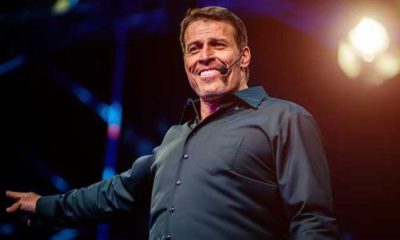Life
Why You Should Use Your Intuition And Chase Your Destiny To The Ends Of The Earth

If you’ve ever felt like you, say yes to opportunities, and you don’t know why that’s your intuition at work. Your intuition is designed to lead you towards your destiny. This is a hot topic for me right now because I have found that opportunities are presenting themselves, and I am saying yes without really knowing why.
When you’re faced with a decision to say yes or no to something, you will usually have an internal reaction or a gut feeling that will guide you. Not everything about our existence can be explained, and your intuition fits perfectly into that category.
Intuition is the ability to make decisions in your life and business based on the way you feel as opposed to facts. By only making decisions based on facts you are nothing more than a computer. Your intuition is what makes you human and it’s what separates you from everyone else.
By using intuition, no two humans will make the same set of decisions because each person will have a different set of references, a different dream, and a different sense of fulfillment.
Decisions based on intuition can help you chase your destiny to the ends of the earth.
Without making this post all about me, I would like to share with you four recent decisions that I made based on my intuition.
1. A Trip To Silicon Valley
As my life has progressed, I feel this strange urge to visit Silicon Valley. My intuition tells me that I am destined to go there, and there are people there that I must meet. The reason Silicon Valley is somewhere I feel I must go is because my whole career is centered around technology, entrepreneurship, and personal development.
Some of the greatest people in these three categories live in Silicon Valley such as Tim Ferriss. The whole culture of Silicon Valley is very informal, and I am told that cafes are like hubs for entrepreneurs and that it’s easy to connect with like-minded people.
I’m consistently told that I am a master networker by my friends so I feel that Silicon Valley is somewhere that I must visit and maybe even spend a longer period of my life there. It’s hard to explain where the urge comes from to visit this technology hub of the world.
All I know is that as each month goes by, my urge to visit Silicon Valley increases and it feels like it’s part of my calling. I have ignored this calling for so long and after a while, if you do the same, it can begin to sabotage your success.
If you think about your own intuition, have there been any places that you have felt you must visit, and yet you have ignored your gut instinct?
I’ve decided in the last few weeks that I am not going to ignore my intuition any further, and I will be heading off to Silicon Valley in the next few months with no plan what so ever. Too much planning can kill the roadmap that your intuition has set out for you.
2. Connecting with “Richard Branson’s Entrepreneur Gatekeeper”
As I’ve written previously on Addicted2Success, I recently connected with a well-known celebrity entrepreneur from Silicon Valley. This is a great example of using nothing other than intuition to make a decision.
I chased this man for over a year, and many of my friends thought I was nuts. They couldn’t understand the fascination with one man. What made it difficult to answer my friend’s questions was that I didn’t have a clear reason to meet this man.
The only reason I had was that my intuition insisted that I must meet him to understand what his purpose was in the world. Somehow, this man’s person was aligned to my own. As it turned out, once I spoke with this man, his purpose to make the world a better place was fairly closely aligned with my own.
His vision to change the world was through technology, whereas mine, was through entrepreneurship and personal development. It’s not an exact match although it is close enough. Through my travels in Silicon Valley, I expect to be meeting up with him to confirm further what my intuition is telling me.
The thing about intuition is that it’s not an exact science. There is a chance that I will go all the way to Silicon Valley to see this man and nothing will come of it. Sometimes, though, your intuition is guiding you towards something because there is a deeper meaning.
I feel like meeting this man in Silicon Valley may be crucial so that I discover the community and end up staying there, as opposed to it being about him individually. My intuition might be guiding me in the right direction and not necessarily to the exact situation. That’s okay. It’s part of the fun of following your intuition because you never know where you’re going to end up.
If you were in this situation, maybe you would meet the person of your dreams or maybe you would meet your co-founder for a new startup. Just know that you should always follow your intuition. I am going to follow mine until I chase my destiny to the ends of the Earth and you should too.
3. Ending a long-term relationship
As many of you know, I recently came out of a long-term relationship. I won’t bore you with all the detail, what I will do though is explain how important intuition is in the ultimate demise of everything I currently know at this point in time.
As the relationship hit some bumpy roads, my intuition told me that this relationship wasn’t right. In these scenario’s, it isn’t that you’re not supposed to be with a particular person, it can often be that it’s not the right time to be with that person.
Maybe you are meant to be apart and then get back together, or maybe after some time apart you realise you are meant to be together. What can also happen is that you both move on, and then years later you end up together again.
There is no right or wrong decision. All you can do is follow your intuition and tap into your emotional being. Work out what feels right and what doesn’t, and make sure your decision takes into account your destiny.
The thing about following your destiny to the ends of the Earth is that if a relationship is stopping you from doing that, there is a good chance that it won’t last long-term. This exact experience has taught me more about success than almost any book could.
“Talking about success is one thing; living and breathing success in everything you do is another. Following your intuition takes guts”
Fear is one of the biggest blockers especially when it comes to ending a relationship. Humans have a fear of being alone and we naturally like to be with someone even if they may not be good for us. Women often tell themselves that they have to get married while they’re young because finding the right person later on in life is harder.
None of these fears are true; the only thing that is true is what your intuition tells you. I have learned to follow my intuition and not always be obsessed with having to know why things happen. Logic can often lead us astray and separate us from our destiny.
Your destiny can’t be avoided and you will be very unfulfilled if you ignore it. Yes, it’s hard. Yes, it’s challenging to end a relationship, and it comes with lots of sadness. You have to be strong. You have to be brave in the face of adversity and not care about the consequences of every decision you make.
Having your heart broken is only temporary and like all feelings, it will pass. Avoiding your destiny, not chasing your dreams, and being unfulfilled, are all things that cannot be sustained long-term. Your happiness depends on you following these three life principles until you have no oxygen left in your lungs to do so.
Never give up. Never believe you can’t achieve your goals. Always remain humble. Always be you.
4. Declining a life-changing business opportunity
Over the last twelve months, I have been fortunate to be offered many business opportunities. I have turned almost all of them down. Any opportunity that is given to you should make you feel instantly ecstatic, if it doesn’t, then follow your intuition and turn it down.
I have been around this business opportunity many times. It encompasses entrepreneurs and loads of personal development, which is right up my alley. My intuition tells me that this opportunity prays on the lower socio-economic parts of the community.
The opportunity encourages people to leave their 9-5, and it says that having a career is horrible. I just don’t buy it. Whether you have a business or work for someone else, it doesn’t matter. All that matters is whether you love what you do, and you get to inspire people.
Any business opportunity that tries to tell me that business is for everyone is wrong. Anyone can learn business, but not everyone should be a business owner. As I went to a few events where similar business opportunities were presented, I quickly found that I didn’t click with the attendees.
Unfortunately for me, I am burdened with being obsessed with success and fulfillment and I struggle to be around people who are not highly motivated for long periods of time. This is just my blueprint, and I don’t believe for a second that it makes me any better than anyone else.
As you can see, your intuition can help guide your business decisions, tell you who to hang around, and even help you decipher the truth. There is a lot of marketing hype in this world, and it’s easy to meet people that talk a good game.
The only way to decode business opportunities accurately is by using your intuition. You won’t always get it right, but it should work well most of the time.
How has your intuition helped you? What tough decisions have you made using your intuition? Let me know in the comments section below or on my website timdenning.net or my Facebook.
Life
Why Moving to a New City Can Change Your Mindset
Discover how moving to a new city boosts neuroplasticity, builds resilience, and reshapes your mindset

Relocation is always a challenge. Rebuilding and restarting your life requires you to step outside of your comfort zone. (more…)
Change Your Mindset
The Hidden Reason You Can’t Stay Consistent
If motivation keeps failing you, the real issue isn’t discipline. It’s the identity shaping your habits and long-term success.

Success often looks like a time-management problem. You buy a planner, set reminders, and hope that next week will be different. For a few days, it works. Then stress hits, motivation drops, and old patterns return. (more…)
Did You Know
How Skilled Migrants Are Building Successful Careers After Moving Countries
Behind every successful skilled migrant career is a mix of resilience, strategy, and navigating systems built for locals.

Moving to a new country for work is exciting, but it can also be unnerving. Skilled migrants leave behind familiar systems, networks, and support to pursue better job opportunities and a better future for their families. (more…)
-

 Business4 weeks ago
Business4 weeks agoThe Salary Shift Giving UK Employers An Unexpected Edge
-

 Scale Your Business4 weeks ago
Scale Your Business4 weeks ago5 Real Ways to Grow Your User Base Fast
-

 Business4 weeks ago
Business4 weeks agoThe Simple Security Stack Every Online Business Needs
-

 Finances4 weeks ago
Finances4 weeks agoWhy Financial Stress Is One of the Biggest Barriers to Personal Growth
-

 Business3 weeks ago
Business3 weeks agoWhy Entrepreneurs Should Care About AI Automation Testing
-

 Business3 weeks ago
Business3 weeks agoWhy Smart FMCG Entrepreneurs Outsource What They Can’t Automate
-

 Business3 weeks ago
Business3 weeks agoWhat Every Business Owner Should Know Before Investing in API Integration
-

 Did You Know3 weeks ago
Did You Know3 weeks agoThe SEO Traps Even Experienced Marketers Fall Into



























6 Comments